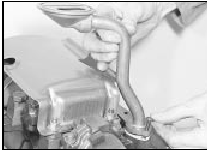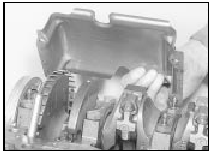Pistons and connecting rods - removal and refitting
Note: New connecting rod bolts and a new oil pick-up pipe gasket must be used on refitting.
Removal
1 Remove the sump and the cylinder head.
2 Unscrew the two securing bolts, and remove the oil pick-up pipe (see illustration).

29.2 Removing the oil pick-up pipe
Recover the gasket.
3 Unscrew the four securing nuts, and withdraw the oil baffle from the studs on the main bearing caps (see illustration).

29.3 Withdrawing the oil baffle
4 Proceed as described in Chapter 2, Part A, Section 32, paragraphs 2 to 5.
Refitting
5 Proceed as described in Chapter 2, Part A,
Section 32, paragraphs 6 to 13, noting the
following points:
6 Take note of the orientation of the bearing
shells during dismantling, and ensure that
they are fitted correctly during reassembly.
7 When fitting the pistons, ensure that the arrow on the piston crown and the letter “F” on the face of the connecting rod are pointing towards the front of the engine.
8 Use new connecting rod bolts on reassembly, and before fitting, oil the threads and the contact faces of the bolts. Tighten the bolts in the three stages given in the Specifications at the beginning of this Chapter.
9 Refit the oil baffle, and tighten the securing nuts.
10 Clean the mating faces of the cylinder block and the oil pick-up pipe, and refit the pick-up pipe using a new gasket.
11 Refit the cylinder head and the sump.
See also:
Rear suspension lower arm (Saloon, Hatchback and Estate models) - removal
and refitting
Models with rear drum brakes
Removal
1 Chock the front wheels, jack up the rear of
the vehicle and support on axle stands placed
under the side members.
2 Remove the relevant driveshaft.
3 Remov ...
Fuel tank - removal and refitting
Note: Refer to the warning at the end of
Section 1 before proceeding.
Removal
1 The fuel tank will normally only need to be
removed if it is severely contaminated with
sediment or other substance ...
Pistons and connecting rods - removal and refitting
1.8 litre (R2A type)
Removal
1 With the engine removed from the vehicle,
remove the sump and the cylinder head.
2 Check the big-end caps for identification
marks and if necessary use a centre-pun ...
